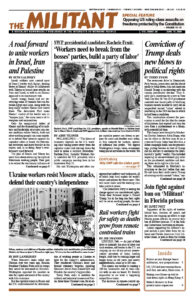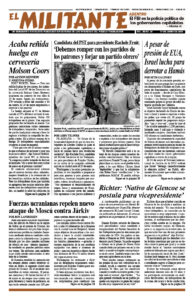Fourteen political figures in Hong Kong opposed to Beijing’s increasingly authoritarian control over the former British colony were found guilty of “subversion” in a landmark trial against political freedoms May 30. Of the 47 originally arrested, 31 had entered guilty pleas. The prosecution has appealed the acquittal of two others over lack of evidence.
The charge carries a minimum of three years and a maximum of life imprisonment. Daniel Chan wrote the Militant from Hong Kong May 31 to say he believes “the defendants would receive very severe sentences.”
The frame-up snared journalists, lawyers and student activists who were charged with trying to “overthrow” the government. Most were already in detention since their arrest over three years ago. Among them were Joshua Wong, a student leader who led large street occupations in 2014 demanding the right to vote, and nurse Winnie Wu, who joined the mass protests for political rights in 2019.
The “crime” the “Hong Kong 47” were charged with was holding a primary election in 2020 in which over 600,000 people voted to select candidates to run against Beijing-selected officials for the city parliament. The judges in the 118-day trial were handpicked by Hong Kong’s Beijing-installed Chief Executive John Lee.
Outside the courthouse, demonstrators protested the verdict. Vanessa Chan, wife of defendant Leung Kwok-hung, one of Hong Kong’s most well-known dissidents, was arrested for “disorderly conduct.”
The prosecution was based on the notorious National Security Law, adopted by unanimous vote under Beijing’s pressure in June 2020, in response to large protests against the Chinese rulers’ tightening grip. It criminalizes what it terms subversion, secession, collusion with foreign forces and terrorist acts. This effectively outlaws all forms of dissent. Some 291 people have already been arrested under its provisions.
This has forced scores of organizations to shut down, including trade unions, media outlets and opposition political parties.
One group shuttered was the Hong Kong Alliance in Support of Patriotic Democratic Movements of China, which for years had organized mass commemorations of Beijing’s brutal crushing of protests by Chinese working people and students on June 4, 1989. Tanks rolled over the large encampment in Beijing’s Tiananmen Square, which had been set up to demand political rights with the support of millions across the country and worldwide.
Some 200,000 people attended the Tiananmen Square commemoration in Hong Kong in 2019. By then, Hong Kong was the only place claimed by Beijing to be part of Chinese territory where telling the truth about the bloodbath was not banned. Now China’s rulers hope to obliterate its memory there too.
The week before the 35th anniversary, police charged Chow Hang-tung — who was already in jail on another frame-up — as well as seven others. They were charged with publishing “seditious materials.” The evidence against Chow, Chan said, are short reminiscences she posted about past June 4 events.
On that date the authorities “deployed a lot of policemen, all fully armed, as they always are nowadays,” at locations where past commemorations have been held, Chan said.
“As a result, we can no longer do” any public demonstrations in Hong Kong. “But events in commemoration of June 4 are being held in many places all over the world.”

